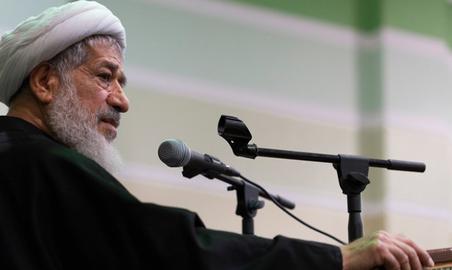On Tuesday, December 15, Mahmoud Amjad, a well-known Shia cleric, published a video protesting against the execution of dissident journalist Ruhollah Zam. In an unprecedented speech, he attacked the Supreme Leader Ayatollah Ali Khamenei, blaming him for all the bloodshed in Iran since 2009 and calling on clerics and religious scholars not to remain silent about the atrocity.
Who is Mahmoud Amjad?
***
Ayatollah Mahmoud Amjad spoke out against violence during the 2009 protests. But his recent remarks about the execution of Ruhollah Zam take a different, sharper tone.
Ayatollah Amjad knew Ruhollah Zam in Iran and Malaysia and was also acquainted with his father. This emotional connection likely inspired the tone of his comments, though he had previously criticized the Leader and parted ways with him and his allies.
Ayatollah Amjad declared Ruhollah Zam a “martyr," the victim of oppression whose blood had been shed unjustly.
He also had said he considers all victims of the Islamic Republic over the last 40 years to be martyrs.
Mahmoud Amjad described a sermon by Ayatollah Khamenei in 2009 as "bloody" and explained that after Khamenei delivered it, he called his son and said: "Arrogance kicked and destroyed Mr. Khamenei, the revolution, Islam, the seminary, Imam and everything; after this sermon, there was bloodshed."
Ayatollah Amjad told Khamenei he was responsible for all the bloodshed in Iran since 2009.
He also objected to the silence of Ayatollah Seyed Ali Sistani's office regarding the use of his name.
On December 15, IranWire reported that a source close to Ayatollah Sistani voiced anger that the senior cleric had been used by Iranian and Iraqi intelligence operatives to push their own agendas. The source suggested that Sistani had condemned the execution, though it was true he has refused to speak in public about it.
Before 2009, Ayatollah Mahmoud Amjad was less well known among the general Iranian public, but he enjoyed popularity with young religious scholars and was known as a "master of ethics.” From the 1990s onwards, he grew in notoriety among students due to his regular visits to dormitories at the University of Tehran and other universities. He became associated with the Supreme Leader’s representatives at educational institutions.
in a way, it was the permanent person in many programs of the institution of leader's representation in universities.
He also had television programs throughout the 1990s, and he peaked in popularity in the late 1990s, becoming well known in Qom and Tehran.
Early Years
Mahmoud Amjad was born in 1939 in the city of Kangavar in Kermanshah province. He went to Qom after completing high school and studied seminary courses with famous lecturers.
For some time after the 1979 revolution, Amjad was the Friday Imam of Nahavand.
He said in an interview that he purposely had not met with Ruhollah Khomeini, the leader of the revolution, in the early days of the Islamic Republic.
He explained the reason for this action: "I did not allow myself to meet him, and the reason was that I was afraid that if the Imam asked me about the situation was, I would have said that it was against my beliefs. If I said it was bad, I would upset the Imam. Therefore, I deprived myself of meeting the Imam."
In the 1990s and early 2000s, Ayatollah Amjad was among the group who represented the Supreme Leader at universities, and he accompanied student Hajj pilgrimages. In his speeches, however, he did not express political positions, choosing to address moral issues. Some reformist figures attended his events.
In 2009, however, the situation changed. He supported Mir Hossein Mousavi as a presidential candidate. "I am convinced of Mr. Mousavi's honesty, and if everyone on earth says otherwise, I will not give up my certainty,” he stated.
"If I were the imam, I would have fired this person," he said of Mahmoud Ahmadinejad following the presidential debates.
Ayatollah Amjad later criticized the crackdown on protesters. He went to Malaysia in 2011 but the Kalameh website reported that his wife and granddaughter were banned from leaving the country when they tried to join him there.
At the time, reformist groups were regularly meeting in Malaysia, and many traveled there after the 2009 presidential election. Conservative principlist media reported negatively on these meetings, and announced that they were being sponsored by the food manufacturers Shirin Asal Company.
Some of this media directly targeted and criticised Amjad. They reported that Azizolah Khoshvaght, a fellow professor of ethics and the father-in-law of the Supreme Leader’s son Mostafa Khamenei, had severed ties with Mahmoud Amjad because of his meetings with reformists. These attacks had a limited impact a short life, unlike attacks on other outspoken clerics and reformists, which went on for years in some cases.
Sometime later, however, divisions grew within a group of political activists and journalists based in Malaysia, and some of them moved to other countries. Ayatollah Amjad returned to Iran and ran in the 2015 Assembly of Experts' elections. However, the Guardian Council did not qualify him to run.
Amjad continued taking a critical stance after returning to Iran. Earlier this year, he spoke out about the Revolutionary Guards’ shooting down of Ukrainian International Airlines Flight 752. "Although the tragedy of the crash of a passenger plane and its cause is tragic enough for us, the dishonesty and inadequacy of [some] high-ranking officials of the system in dealing with this issue is a greater tragedy."
He has become increasingly critical of Ayatollah Khamenei himself, and the comments about Zam are the latest examples of this. Given his influence among religious people from the younger generation, his comments and stance will not have been missed by the Supreme Leader of the Islamic Republic, and the consequences for him could be severe.
visit the accountability section
In this section of Iran Wire, you can contact the officials and launch your campaign for various problems


























comments